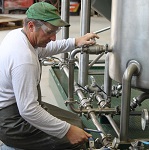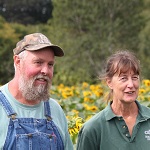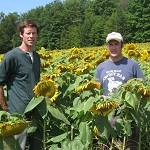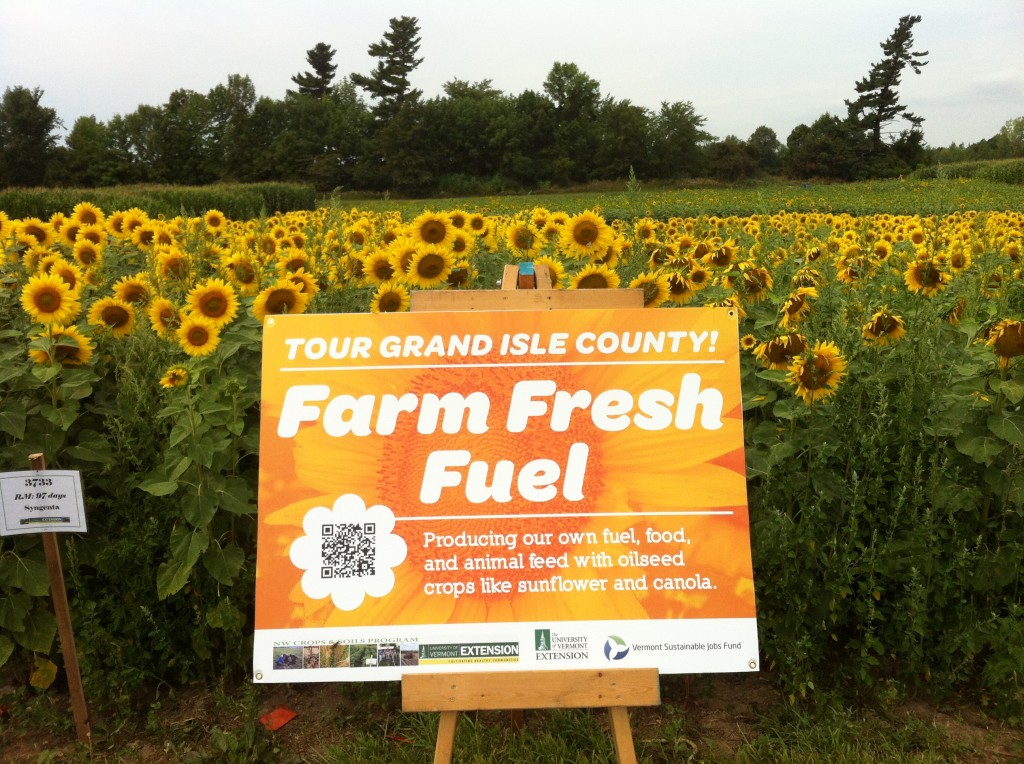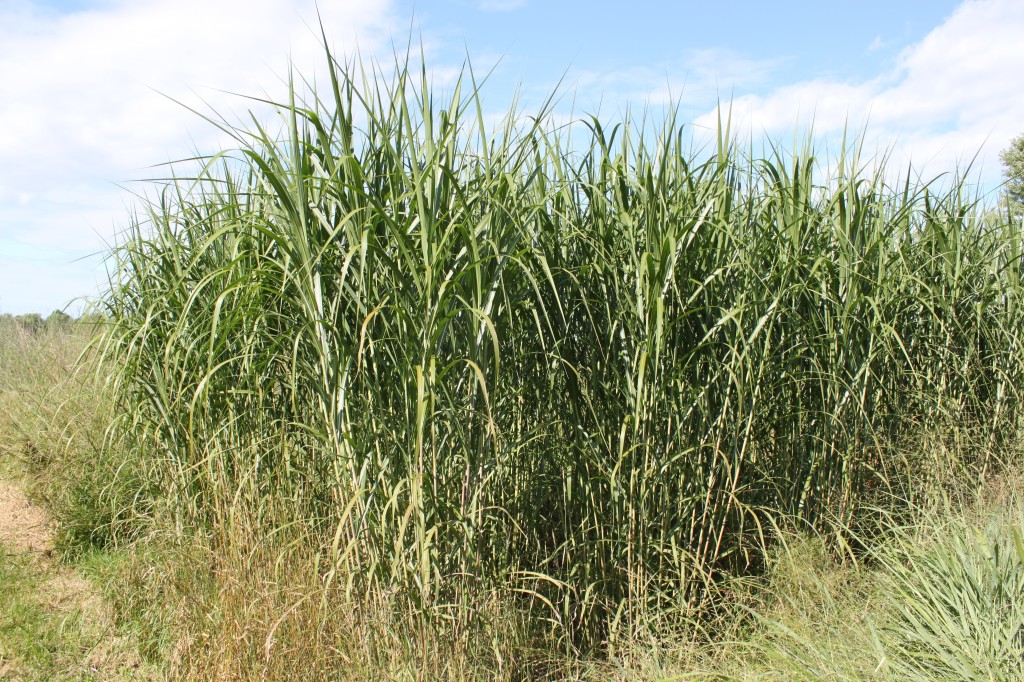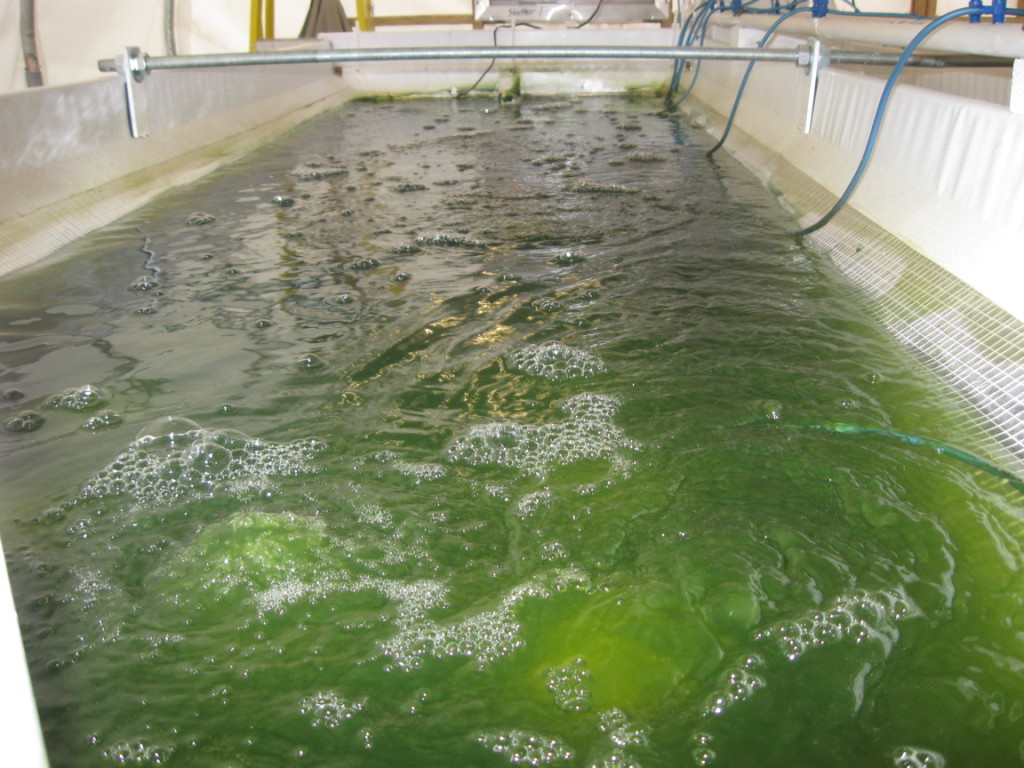19 Sep 2013
State Line Farm
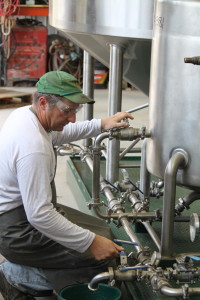 Feedstock: Sunflowers, canola, mustard
Feedstock: Sunflowers, canola, mustard
Fuel: Biodiesel
Energy Output: Power (for farm machinery)
Services: Oilseed and Grain Grower, Oil milling, Fuel Processing, Feed Supply
Owner: John Williamson
Location: Shaftsbury, Vermont; Bennington County
On the forefront of oilseed crop growing in a northeastern climate, State Line Biofuels is Vermont’s first on-farm facility making biodiesel made from oilseed crops grown on-site and from neighboring farms.
The Williamson family has owned State Line Farm in southwest Vermont alongside the border of New York since 1936. For many years, State Line was run as a traditional dairy farm, but falling milk prices caused them to sell the herd and look towards diversifying the farm’s operations.
John and his family currently produce maple syrup, honey, sorghum syrup and hay for sale in local markets. Since 2004, State Line Farm has also experimented with sunflower, canola, mustard, and flax varieties in an effort to fuel their farm with biodiesel.
Read More
19 Sep 2013
Ekolott Farm
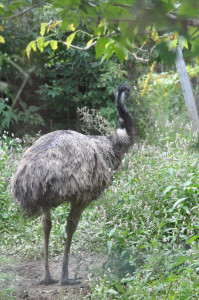 Feedstock: Sunflowers, soybeans and canola
Feedstock: Sunflowers, soybeans and canola
Fuel: Biodiesel
Co-products: High-protein sunflower meal as feed ingredient
Energy Output: Power (for farm machinery) and heat (for farmhouse)
Services: Oilseed Grower, Oil milling, Feed Supply
Owner: Larry Scott and Peggy Hewes
Location: Newbury, Vermont
Larry Scott and Peggy Hewes operate Ekolott Farm—a diversified farm raising emus, Herefords, and hogs, and growing feed and energy crops such as shell corn, sunflowers, and soybeans on 200 acres of Connecticut River valley land. Ekolott produces biodiesel to fuel a portion of their tractor work, all of their own heat and an increasing amount of the feed ingredients for their animals, including grains and sunflower seed meal.
Ekolott is a three-generation dairy farm that moved to Vermont from Massachusetts in 1980. The farm consistently achieved Vermont milk quality awards with their 220 registered Holsteins, until the cows were sold in 2004.
Diversification of the farm had already begun in 1994 when the Scott family began raising emus (they are currently the largest and one of the oldest emu farms in Vermont, under the name Riverside Emus). With barns and pasture freed up after the dairy herd was sold, the Scott-Hewes took on raising Herefords and hogs and have been developing a local customer base for their beef, pork, and emu through on-farm and farmers’ market sales.
Read More
19 Sep 2013
Borderview Research Farm
Feedstock: Sunflowers, canola, switchgrass
Fuel: Biodiesel and grass pellets
Energy Output: Power (for farm machinery) and heat
Services: Oilseed and Grain Grower, Oil milling, Biomass Pelletizing, Fuel Processing, Feed Supply
Owner: Roger and Claire Rainville
Location: Alburgh, Vermont; Grand Isle County
Having sold his dairy herd several years ago and thinking he was heading into semi-retirement, Roger Rainville began experimenting with farm-scale biodiesel production on his family farm in northern Vermont, which literally hugs the Canadian border.
The University of Vermont (UVM) now leases a number of acres from the Rainvilles as Borderview Farm has become one of the best-known applied research facilities in Vermont. Roger, along with Dr. Heather Darby, a UVM Extension agronomist, and her team have helped transform the former dairy farm, conducting leading research in the Northeast on oilseed crops, perennial grasses, hops, small grains and other crops suitable for small-scale and value-added farming.
Read More
17 Sep 2013
North Hardwick Organic Dairy
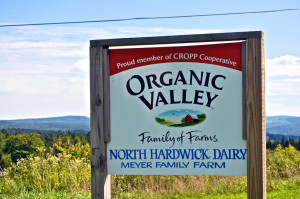 Feedstock: Sunflowers, certified organic
Feedstock: Sunflowers, certified organic
Fuel: Biodiesel
Co-products: High-protein sunflower meal as feed ingredient
Energy Output: Power (for farm machinery)
Services: Oilseed Grower, Oil milling, Fuel Processing, Feed Supply
Owner: Nick and Taylor Meyer
Location: Hardwick, Vermont
The Meyer family has owned and operated their dairy on a 327-acre farm in Hardwick, Vermont since 1978. In 2003, when the younger Meyer boys took over the farm where they grew up, they transitioned to organic production. Today, Nick and Taylor produce some of the highest quality milk in the state of Vermont, winning numerous awards and gaining notoriety for their sustainable and innovative approach.
That approach has included efforts to reduce overhead costs by making the farm as self-sufficient as possible. A Bergy Wind Turbine was erected in 2007 to provide some of the farm’s electricity and Andrew began making biodiesel from waste vegetable oil in 2008. All the tractors on the farm run on B50 (50% biodiesel & 50% petrodiesel) for the summer and the furnace runs on B15 for the winter months.
“I want to produce everything the farm needs, without buying out (off the farm)” Nick Meyer explains. North Hardwick Dairy (NHD) uses 4,000 gallons of diesel each year (2,000 gallons of diesel for off- road equipment and 2,000 gallons in their furnace).
Read More
27 Aug 2013
UVM Crops and Soils 2013 Annual Field Day
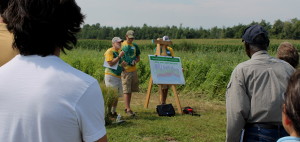 The University of Vermont Extension Northwest Crops and Soils team held their annual Field Day on Thursday, August 1, 2013 from 10:00am to 3:30pm at Borderview Research Farm in Alburgh, Vermont.
The University of Vermont Extension Northwest Crops and Soils team held their annual Field Day on Thursday, August 1, 2013 from 10:00am to 3:30pm at Borderview Research Farm in Alburgh, Vermont.
Dr. Heather Darby led more than 200 attendees on a tour of research stations at the farm. The theme of this year’s field day was “Strategic Farming – Gearing Up for Weather Extremes.” Tour stops included brief overviews fr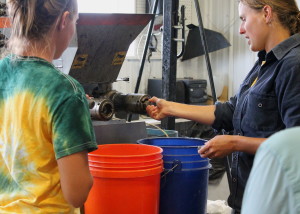 om researchers and technicians focused on cover crops, irrigation systems, sunflowers for cooking oil and biodiesel, wheat varieties, aerial seeding, hops variety trials and demonstration of a mechanized hops harvester, and demonstration of an oilseed press.
om researchers and technicians focused on cover crops, irrigation systems, sunflowers for cooking oil and biodiesel, wheat varieties, aerial seeding, hops variety trials and demonstration of a mechanized hops harvester, and demonstration of an oilseed press.
Vermont Bioenergy Initiative was in attendance with the Bioenergy Now! videos along with copies of the report, Vermont On-Farm Oilseed Enterprises: Production Capacity and Breakeven Economics written by Netaka White, formerly of VSJF and now of Full Sun Company, and Chris Callahan with UVM Extension.
More than 20 attendees, many of them farmers, attended the demonstration of the two oilseed presses at Borderview Farm by Hannah Hardwood of UVM Extension and Roger Rainville, owner along with his wife, Claire, of Borderview Farm.
10 Jul 2013
Green Mountain Spark, LLC
As an alternative to biodiesel, Green Mountain Spark (GMS) with the support of the University of Vermont (UVM) Chemistry Department is optimizing a chemical conversion process for the decarboxylation of vegetable oils to generate a new green diesel fuel. The chemical structure of the hydrocarbon fuel products formed from the decarboxylation process is very similar to compounds present in conventional petrodiesel, allowing easy adoption of this fuel (green diesel) into existing infrastructure. Compared to biodiesel, this fuel will have improved fuel storage and transportation properties as well as superior cold weather characteristics.
Read More
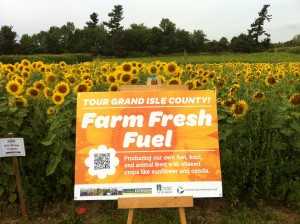
A roadside sign informs passerby of the Farm Fresh Fuel project in Grand Isle County, Vermont. Photo credit: VSJF
A small revolution is happening in Grand Isle County, a declaration of fuel independence: In 2012, ten farmers and landowners tried their hand at growing sunflowers to have the oil made into biodiesel to fuel farm equipment or heat their homes.
Many farmers want to diversify their operation, control and lower fuel costs, and become more self-sufficient. Additionally, locally-grown renewable energy will support the agriculture economy. In Grand Isle County, growing their own biodiesel can save farmers more than $2.00 per gallon, according to a new study released by the Vermont Sustainable Jobs Fund (See the report, Vermont On-Farm Oilseed Enterprises: Production Capacity and Breakeven Economics). Emerging feedstocks and new technology takes know-how, and the Vermont Bioenergy Initiative (VBI) at Vermont Sustainable Jobs Fund is taking steps to overcome barriers to energy self-sufficiency on the farm.
With funding from the U.S. Department of Energy, Borderview Farm staff and UVM Extension researchers guided the planting, tending, and harvesting of more than 60 acres of sunflowers in the 2012 growing season for the Grand Isle Farm Fresh Fuels Project. Each farmer planted two to ten acres of sunflowers, growing more than 30 tons of sunflower seeds. The seeds will be pressed into 3,000 gallons of renewable, low-emission biodiesel and 26 tons of oilseed meal to feed livestock or use as pellet fuel.
For the UVM researchers, coordinating the project, overcoming some of the logistical challenges, and shepherding a successful crop of sunflowers into the storage bin at Roger Rainville’s farm was all part of the job. The lessons learned this year in Grand Isle County also contribute to a growing body of knowledge that is helping farmers in other regions put more acres under oilseed production and save money on their fuel bills.
To learn more about the Farm Fresh Fuel project, visit the UVM website and the Oilseeds section of this website.
08 Jul 2013
What is the Vermont Bioenergy Initiative?
The Vermont Bioenergy Initiative (VBI) is working to replace a portion of the fossil fuel energy consumed in-state with homegrown alternatives from oilseed crops, perennial grasses and algae. Our grant making and technical assistance are aimed at addressing the most critical issues of our time — peak oil, energy price volatility, and climate change – using an innovative ‘local production for local use’ market development model.
The Vermont Bioenergy Initiative supports the expansion of the supply of and demand for locally produced and commodity-level biofuels in Vermont in order to reduce the state’s dependency on petroleum. By providing grant funding and technical assistance to new businesses, VBI promotes entrepreneurial activity in the emerging biofuels sector that will eventually create livable wage jobs. Further, stimulating farm-based biofuels and bioenergy production enhances farm viability and thereby local food security. In addition to grant-making and technical assistance, VBI helps to educate the public about the benefits of sustainably- and locally-produced bioenergy feedstocks and fuels.
08 Jul 2013
What is Bioenergy?
The term “Bioenergy” refers to renewable energy fuels and feedstocks derived from biological sources; these can be agricultural biomass, liquid biofuels, and biogas used for heat, electricity, combined heat and power, or vehicle fuel. The term is often used synonymously with “biofuels.”
Some examples of bioenergy feedstocks and fuels being developed in Vermont include switchgrass, hay and other agricultural biomass for heat and power; oilseeds (like canola, sunflower and soybean) and algae for biodiesel; animal waste and food scraps for anaerobic digesters and captured landfill gas to create electricity and biomethane.
While there are a variety of bioenergy feedstocks and fuels, there are three primary focus areas for VBI: Algae, Grass, and Oilseeds.
Algae: Microalgae such as green algae and diatoms can be grown and pressed for oil, fuel, feed, food and fertilizer.
Grass: Perennial grasses like switchgrass, big bluestem, reed canarygrass, and Miscanthus can be grown and compressed into pellets or briquettes for use as heating fuel.
Oilseeds: Oilseeds such as sunflower, soybean, and canola can be grown and pressed for oil that can be made into food-grade cooking oil or biodiesel. The leftover meal is a co-product that can be used for livestock feed and organic fertilizer.
Click here to read more about the Vermont Bioenergy Initiative.
18 Mar 2010
Algae and Energy in the Northeast Conference

“Algae and Energy in the Northeast was co-hosted by the University of Vermont, Vermont Epscor, and Vermont Bioenergy Initiative.
A conference on Algae & Energy in the Northeast, co-hosted by the University of Vermont and the Vermont Sustainable Jobs Fund, was held at the University of Vermont in Burlington on March 17 & 18, 2010.
Topics covered include:
- Overcoming challenges to algae feedstock production in the Northeast
- Algal harvesting, lipid (oil) extraction, and biofuel conversion
- Uses and markets for algal oil and by-products
- Concurrent poster session featuring algae R&D projects.
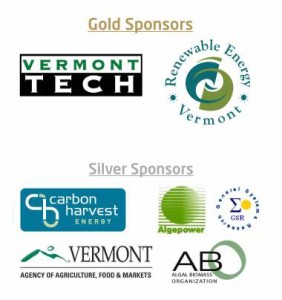
The conference “Algae and Energy in the Northeast” was sponsored by Vermont Technical College, Renewable Energy Vermont, Carbon Harvest, Algae Power, General Systems Research, Vermont Agency of Agriculture, Food and Markets, and Algae Biomass Organization.
Some of the foremost algae researchers and entrepreneurs presented the current state and projected future of algae as a biofuel feedstock, including:
- Conference Objectives & Outcomes: Dr. Anju Dahiya (University of Vermont, Cofounder General Systems Research LLC)
- Development of Microalgal Biofuels: A National Laboratory Perspective:Dr. Al Darzins (Principal Group Manager NREL)
- Pumping Algae! An Alternative Energy Future: Donald Redalje – Univ. of Southern Mississippi Department of Marine Science and Cofounder of HR BioPetroleum Inc.
- Algae Grown on Agricultural Wastewater: Algal Production, Composition and Utilization: Dr. Walter Mulbury (Environmental Management and Byproducts Lab, USDA Beltsville, Maryland)
- Algae Farming for Biofuel Feedstocks: Dr. Ron Putt – Chemical Engineering Department, Auburn University
- Algae to Biofuel: Opportunities and Challenges: Vikram M Pattarkine, PhD – CEO, PEACE USA and formerly CTO/Chief Scientist, OriginOil
- Algae for Biofeeds and Biofuels: Dr. Ira Levine (University of Southern Maine)
- Algae Culture and Biofuels Development in Integrated Systems: Dr. Mary Watzin (University of Vermont)
- Microalgae Production of Biodiesel: Dr. Ihab H. Farag (University of New Hampshire)
- Poster Sessions: The Conference presented concurrent poster sessions featuring regional algae research and demonstration projects.




